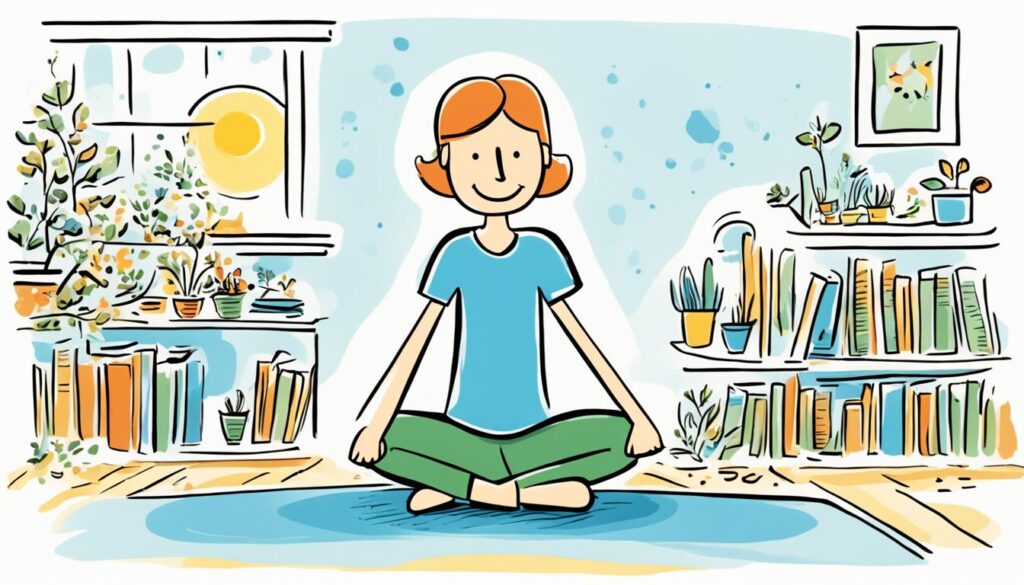Do you know someone who seems to get easily overwhelmed by social interaction or excessive stimuli? Have you ever wondered how to support them or help them manage their overstimulation? In this article, we will delve into the world of introverts and explore powerful strategies for dealing with their unique needs.
Introverts are individuals who recharge their energy by spending time alone. While they possess many strengths, they can also become easily overstimulated, leading to exhaustion, irritability, and decreased mental well-being. Understanding how to navigate their overstimulation is key to creating supportive environments and maintaining healthy relationships with introverts.
Key Takeaways:
- Introverts recharge their energy by spending time alone.
- Overstimulation can lead to exhaustion and decreased mental well-being in introverts.
- Understanding and respecting introvert needs is crucial for creating supportive environments.
- There are powerful strategies to help introverts manage their overstimulation.
- By implementing these tips, you can support the introverts in your life and strengthen your relationships.
Notice warning signs like fidgeting
When dealing with introverts who get overstimulated easily, it’s crucial to pay attention to their warning signs, such as fidgeting, restlessness, or discomfort. These behaviors can indicate that the introvert is reaching their limit and may need a break from the current environment or situation.
For example, imagine you’re attending a social gathering with your introverted friend, Sarah. As the evening progresses, you notice Sarah starting to fidget and appear increasingly unsettled. Recognizing these warning signs, you approach Sarah and offer her supportive options to help alleviate her overstimulation.
| Warning Sign | Possible Interpretation |
|---|---|
| Fidgeting | The individual may be experiencing discomfort or restlessness due to overstimulation. |
| Restlessness | The person might be finding it challenging to stay engaged in the current situation due to overstimulation. |
| Discomfort | An introvert’s sensitivity can make them more susceptible to feeling uncomfortable in overwhelming environments. |
By being aware of these warning signs, you can intervene early and provide the necessary support to prevent overstimulation from escalating. Taking prompt action demonstrates your understanding and empathy towards introverts and their unique needs.
Suggest taking a break from interaction
When you notice an introvert showing signs of overstimulation, it’s important to suggest taking a break from the current social interaction. Respectfully communicate that it’s okay for them to step away and have some time alone to recharge their energy.
This break can be as short as a few minutes or longer, depending on the individual’s needs. By encouraging the introvert to take some time for themselves, you are acknowledging their introvert needs and providing them with an opportunity to recharge and recover.

Remember, introverts regain their energy through alone time, so allowing them to take a break can help prevent overstimulation and support their well-being.
Provide headphones or ask to step away
If the overstimulation is caused by excessive noise or sensory input, offering the introvert a pair of headphones can be a simple yet effective solution. Noise-cancelling headphones, in particular, can help reduce the sensory overload and create a more comfortable environment for the introvert.
Alternatively, you can ask the introvert if they would like to step away from the current situation and find a quieter area to relax. Sometimes, a few moments of solitude can provide the necessary respite from the overstimulation they may be experiencing.
| Situation | Solution |
|---|---|
| Noisy environment | Provide noise-cancelling headphones |
| Excessive sensory input | Suggest finding a quieter space |
By addressing the specific needs of introverts who are sensitive to noise or sensory overload, you can help create a more supportive and accommodating environment for them.
Recognize need for time alone afterwards
After experiencing overstimulation, introverts often need time alone to recharge and recover. It is essential to recognize and respect their need for solitude as a means of self-care.
Encourage the introvert to take the necessary time alone without feeling guilty or pressured to engage in social activities immediately afterward. This alone time allows them to replenish their energy and regain their mental well-being.
It’s important to understand that introverts may experience what is commonly known as an “introvert hangover.” This refers to a period of time after overstimulation when introverts may need to limit further social interaction and focus on recharging.

Allowing introverts to honor their need for time alone demonstrates support and understanding for their unique recharge process.
Limit stimulating factors like noise, crowds
One of the key strategies for preventing overstimulation in introverts is to limit or control stimulating factors that can contribute to their sensory overload. By creating an environment that is conducive to introvert needs, you can help them manage their energy and avoid feeling overwhelmed.
Here are some practical tips to limit stimulating factors for introverts:
- Avoid excessively noisy environments or events with loud music. The constant noise can quickly drain an introvert’s energy.
- Choose venues or locations that are less crowded, allowing introverts to have personal space and a sense of calm.
- Offer quiet spaces where introverts can retreat to if they need a break from social interaction. This gives them an opportunity to recharge their energy.
By taking these measures, you create an introvert-friendly environment that respects their needs and reduces the risk of overstimulation.
| Stimulating Factors | Impact on Introverts |
|---|---|
| Noise | Drains energy and causes sensory overload |
| Crowds | Can be overwhelming and lead to social exhaustion |
Plan social events carefully to avoid overload
When organizing social events or activities involving introverts, it’s important to plan them carefully to avoid overwhelming the introverts. Taking their needs into consideration and creating introvert-friendly environments can ensure a more enjoyable experience for everyone involved.
Here are some strategies to help you plan social events that respect introvert boundaries and avoid overload:
- Create a schedule with built-in breaks: Integrate regular breaks into the event schedule to give introverts time to recharge. This could include short breaks between activities or designated quiet spaces where introverts can retreat to if needed.
- Offer smaller group options: Consider organizing smaller group activities or providing opportunities for introverts to engage in more intimate conversations. This can create a more comfortable and manageable social setting.
- Communicate openly about expectations: Clearly communicate the schedule and expectations of the event to all participants, including the need for breaks and respect for introvert boundaries. Openly discuss any concerns or preferences beforehand.
- Provide introvert-friendly activities: Incorporate activities that cater to introvert preferences, such as quiet games, group discussions with clear structure, or creative projects that allow for individual expression.
- Offer alternative participation options: Consider providing alternative ways for introverts to participate in the event, such as engaging in smaller group conversations, contributing through written materials, or participating in virtual settings if possible.
By implementing these strategies, you can create social events that are inclusive and considerate of introvert needs. Remember, it’s essential to respect introvert boundaries and provide opportunities for introverts to recharge and participate in a way that feels comfortable to them.

Thank them for speaking up about limits
The communication and expression of personal limits is essential for introverts to effectively manage their overstimulation. When introverts voice their limits or express their need for a break, it’s important to acknowledge and appreciate their openness. By thanking them for speaking up, you encourage a culture of open communication and demonstrate that their needs are respected and valued.
Expressing gratitude towards introverts who communicate their limits serves multiple purposes. It:
- Bolsters introvert support: Thanking introverts for speaking up creates a supportive environment where they feel comfortable expressing their limits.
- Encourages open communication: Expressing gratitude encourages introverts to continue sharing their needs, feelings, and boundaries, fostering a culture of open dialogue.
- Validates introvert needs: By appreciating introverts for voicing their limits, you signal that their needs are valid and worthy of consideration.
- Builds trust and rapport: Thanking introverts for their honesty helps build trust and strengthens relationships, promoting a positive and supportive dynamic.
Remember, introverts may find it challenging to speak up about their limits due to societal expectations or fear of judgment. Therefore, expressing gratitude for their communication efforts is crucial in ensuring their well-being and fostering understanding.
Respect sensory needs as non-negotiable
Sensory needs are a crucial aspect of an introvert’s well-being. For introverts who get overstimulated easily, respecting their sensory needs is non-negotiable. It’s essential to create an environment that supports their sensitivity and allows them to manage their sensory overload.
One example of respecting sensory needs is by providing a quieter environment. Dimmer lighting can also help introverts feel more comfortable and relaxed. By accommodating their request for a quieter setting and adjusting the lighting, you can create a space that is conducive to their well-being and comfort.

Understanding and supporting introverts’ sensory needs contribute to their overall comfort and mental well-being. It shows that you value their feelings and respect their boundaries. By acknowledging the importance of sensory adjustments, you create an inclusive and supportive environment for introverts.
| Ways to respect sensory needs: | Benefits |
|---|---|
| Provide a quieter environment | – Reduces sensory overload – Creates a more comfortable space |
| Adjust lighting | – Enhances relaxation – Reduces sensory stimulation |
| Accommodate special sensory requests | – Demonstrates empathy – Supports introverts’ well-being |
Respecting sensory needs as non-negotiable not only benefits introverts but also fosters a culture of understanding and support. By creating an environment that acknowledges and adapts to their sensory sensitivity, you can help introverts navigate the challenges of overstimulation and promote their overall comfort and happiness.
Offer reassuring check-ins after recharging
Once the introvert has had the opportunity to recharge their energy, it’s important to offer reassuring check-ins to see how they are doing. This shows that you care about their well-being and provides them with an opportunity to express any additional needs or concerns they may have.
Respecting their need for personal space, let them know that you are available if they want to talk or re-engage in social activities. Avoid pressuring them to immediately jump back into social interactions; instead, allow them to take their time and decide what level of engagement feels comfortable for them.
Remember that everyone’s recharging process is different, and it’s essential to be understanding and patient. By offering check-ins, you create a supportive environment where introverts feel valued and supported.
FAQ
How can I recognize signs of overstimulation in introverts?
Pay attention to signs such as fidgeting, restlessness, or discomfort. These behaviors indicate that the introvert may be reaching their limit and need a break from the current environment or situation.
What should I do if I notice an introvert showing signs of overstimulation?
Suggest taking a break from the current social interaction. Respectfully communicate that it’s okay for them to step away and have some time alone to recharge their energy.
How can I help an introvert who is overstimulated by excessive noise or sensory input?
Provide headphones or suggest finding a quieter space. Noise-cancelling headphones can help reduce the sensory overload and create a more comfortable environment for the introvert. Alternatively, ask if they would like to step away and find a quieter area to relax.
Why is it important to recognize the need for time alone after overstimulation?
After experiencing overstimulation, introverts often need time alone to recharge and recover. Recognize the importance of this alone time and encourage the introvert to take it without feeling guilty or pressured to engage in social activities immediately afterwards.
How can I prevent overstimulation in introverts?
It’s important to limit or control stimulating factors such as excessive noise or large crowds. Choose environments that are less crowded or offer quiet spaces where the introvert can retreat to if needed.
How can I plan social events to avoid overwhelming introverts?
When organizing social events involving introverts, plan them carefully to avoid overwhelming them. Consider their needs for breaks, quiet spaces, and smaller groups. Respect their boundaries and communicate openly about the schedule and expectations of the event.
How can I show appreciation when introverts express their limits?
Acknowledge and appreciate when introverts voice their limits or express their need for a break. Thanking them for speaking up encourages open communication and shows that their needs are respected and valued.
Should I respect introverts’ sensory needs even if they seem excessive?
Yes, sensory needs are often non-negotiable for introverts who get overstimulated easily. Respect their requests for a quieter environment, dimmer lighting, or other accommodations that help them manage their sensory sensitivity.
How can I support introverts after they have had time to recharge?
Offer reassuring check-ins to see how they are doing. Respect their need for personal space but let them know that you are available if they want to talk or re-engage in social activities.